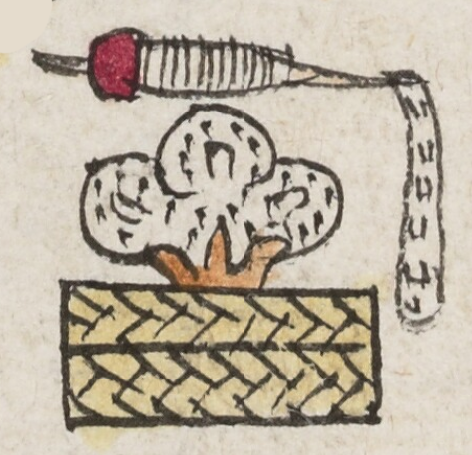malacatl (Mdz59r)
This example of iconography from the Codex Mendoza shows a spindle (what we are calling a malacatl, even though we do not have a Nahuatl-language gloss to support this). We are including it for the purpose of making comparisons with hieroglyphs and glyphic elements in this collection. The spindle here lies on its side, horizontal, loaded with thread or yarn, and with the fluff hanging down. The spindle may be made of wood. The thread on the spindle forms an implicit spiral. The fluff has U-shapes in it, which could be a texturing or perhaps seeds and chaff caught in the material for spinning. The shape is reminiscent of the U's in agricultural fields (tlalli, milli). The weight at the base of the spindle is red.
Stephanie Wood
The contextualizing image shows that the thread that has been spun comes from the cotton plant. A basket is provided, too, as a place where spinning materials were likely stored. In one of the comparative examples, also below, the divine force Xolotl makes an appearance; note the spindle in his headdress.
Stephanie Wood
c. 1541, or by 1553 at the latest
Stephanie Wood
spinning, spindle, spiral, threads, bobina, espiral, verticilo de huso, hilatura, hilo
malaca(tl), spindle, bobbin, spiral, https://nahuatl.wired-humanities.org/content/malacatl
el huso
Stephanie Wood
Codex Mendoza, folio 59 recto, https://digital.bodleian.ox.ac.uk/objects/2fea788e-2aa2-4f08-b6d9-648c00..., image 128 of 188.
Original manuscript is held by the Bodleian Libraries, University of Oxford, MS. Arch. Selden. A. 1; used here with the UK Creative Commons, “Attribution-NonCommercial-ShareAlike 3.0 License” (CC-BY-NC-SA 3.0)



